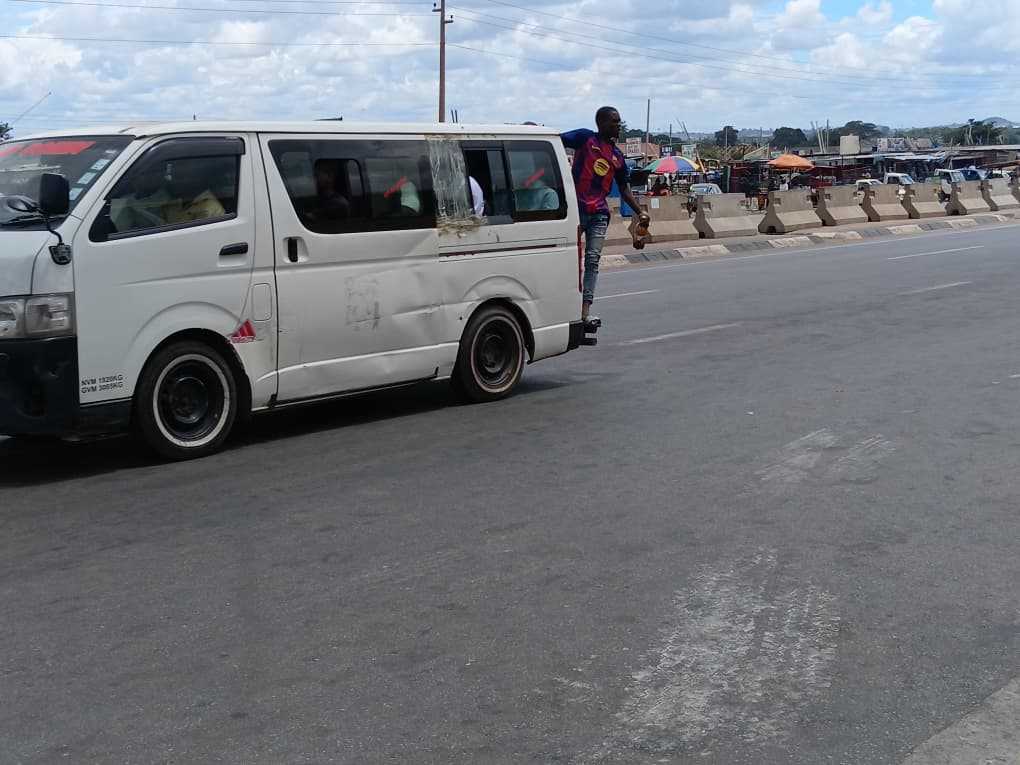
Fitzgerald Munyoro
Resident of Ward 22 Ngorima B, Rusitu Ward, Chimanimani district, Manicaland, Mugari Muganga, then 33, went into the first phase of labor at the worst time and place possible: by the roadside whilst loading bananas into a truck.
Muganga now aged 50, remembers waking up feeling fatigued and sharp pains throbbing her joints and spine.
"I just brushed it aside as a bad day since I was heavily pregnant at the time and I proceeded to work in the banana fields."
As her daily routine demanded, she meticulously inspected some of the produce on the banana trees, whilst she was doing so she was startled by the incessant hooting and grumbling noise of a truck engine by the roadside.
“Something was wrong with me that day, I could feel it but I did not know excatly what it was and I kept ignoring that lingering feeling. After I heard the noise of the truck, I went to meet my wholesale customers from Marondera who had been waiting for me since 5 am.
"One of them asked me why I was uncharacteristically late. I mumbled something which I don't even remember. The client then informed me that he was running late and he had to been at the Marondera market by half past eight." says Muganga.
An apologetic gesture, Muganga offered to assist her clients in carrying the bananas from the field and hurling them into the truck.
A few minutes into the task, Muganga remembers feeling trickles of water dripping down her legs as she was carrying a branch of bananas.
When she sat down, the men realized that this was not something they could assist with.
"They alerted some women from nearby homesteads. The ladies who were probably my age or even younger appeared clueless and suggested that we try to reach the clinic in Mutadzi village which is 10 to 15 kilometers away,"said Muganga.
Muganga's labour pains worsened in a short space of time and she would wince in agony every four steps.
One of the ladies then rushed to call some elderly village midwives who then helped Muganga to deliver a baby girl whom she named Memory.
17 years, the story is still the same
Muganga is one of the few fortunate mothers who have had a safe roadside delivery assisted by experienced village midwives.
The same cannot be said for other would be mothers. Their ears have never heard the cries of their newborn baby and their wombs have delivered lifeless corpses. This is mainly due to the fact that Vhimba area which lies on the edges of the Rusitu River that flows between the Zimbawean and Mozambican border does not have any semblance of maternity facilities at it's clinic to cater for its 22 villages. The barely serviceable road network took the worst punch of the Cyclone Idai landslides and rendered the area inaccessible.
One of the women who has experienced tragedy is Memory Muchawaya 37 who has endured one miscarriage and one stillbirth.
Muchawaya points at the lack of medical care as being the chief cause.
"I'm sure if I had access to a hospital, I would have gone for regular check ups and any problems or complications would have been addressed. I did not know my expected dates and I did not know what to do in preparation for my coming baby."
"As a first time expecting mother, it was very painful to miscarry at six months, traumatic to give birth to a lifeless child. I do want to be a mother. As a wife, my husband is very expectant of me."said Muchawaya.
Sidelined in Cyclone Idai recovery programme
Muchawaya says tha Vhimba residents thought Cyclone Idai recovery development would benefit their area.
"I thought in the aftermath of Cyclone Idai, responsible authorities would also come to our help as our road network was destroyed. But that never happened.” said Muchawaya.
Cyclone Idai struck Zimbabwe in March 2019, causing extensive damage worth an estimated $622 million.
Related Stories
Over 50,000 households were destroyed, directly affecting 270,000 people, including 60,000 who were displaced.
At the time of the disaster, it was reported that up to $1.1 billion was needed to support Zimbabwe’s recovery and restore damaged infrastructure and livelihoods.
In September 2019, The Zimbabweans government in partnership with African Development Bank and United Nations Operations pledged a total of $94 million to rebuild affected areas.
The World Bank provided a $72 million grant to fund the Zimbabwe Idai Recovery Project (ZIRP), which would provide immediate support for the most affected communities across nine districts.
ZIRP committed to rebuilding community infrastructure and restoring livelihoods through cash transfers, restoring agricultural crops and livestock production, and revitalizing basic healthcare services.
The AfDB funded the other $24.5 million project that will help restore essential services including transport, electricity, and water and sanitation to the most severely affected communities in the districts of Chimanimani and Chipinge in Manicaland province.
However, the Ngangu area together with other mainstream Chimanimani areas have been the main benefactors of the recovery project.
The picture is bad
Ironically, in a 2021 progress report published by ZIRP and the United Nations, the issue of non-functional health facilities is acknowledged as a major drawback to prevailing recovery efforts.
In a section that speaks on health facilities in Chimanimani, the report reads;
"During the May 2021 assessment, the majority of the (99outof158) villages reported having no functional health facilities and 55 villages reported having functional health facilities.
"A huge number of villages reporting unavaiabiity of health care facilities implies that the village members have to travel for some distance to the neighbouring vilages to access health care services.”
In the latest Multiple Indicator Cluster Surveys(MICS) 2019 report, Zimbabwe has recorded a decline in maternal mortality from 614 to 462 deaths per 100 000 pregnancies since 2014.
According to findings in the 2022 Housing and Population Census, maternal mortality in Zimbabwe is 363 per 100 000.
A year by year study by Gender and Development in SADC ranks Zimbabwe as the second highest in SADC only behind Democratic Republic of Congo.
Though there is a decline, the figures remain quite high.
Lion Club International needs USD25 thousand to save the day
Voluntary organization Lions Club International has mobilized funds to the tune of $75 000 usd to help set up a maternity wing at the existing site of the Vhimba clinic.
A total of $100 000usd is needed to set up a fully functional maternity wing.
District Chairperson Marketing Lion Linda Matowa said the Lions Club felt it had to do something.
"We came to a realisation that women were travelling long distances to go to the nearest health care facility, which is Rusitu valley.
"During the Cyclone Idai debacle, Rusitu valley was flooded and people were left stranded and with no electricity or even the means to get to the next hospital,"she said.
She also appealed to well wishers to assist in raising the remaining $25 000usd.
"We are open to donations to help raise the need US$25 000 for the completion of the project and we call upon all sectors."
"Any amount no matter how big or small will definitely make a difference, " she said.



















Leave Comments